温馨提示:如果使用电脑查看图片不清晰,可以使用手机打开文章单击文中的图片放大查看高清原图。
Fayson的github:
https://github.com/fayson/cdhproject
提示:代码块部分可以左右滑动查看噢
1
文档编写目的
在前面的文章Fayson介绍了《如何使用Java连接Kerberos的HBase》,虽然非Kerberos环境下访问HBase比较简单,本篇文章Fayson还是主要介绍使用Java访问非Kerberos环境的HBase。
- 测试环境
1.CDH版本为5.13.1
2.OS为Redhat7.2
2
环境准备
1.从CDH集群下载HBase客户端配置
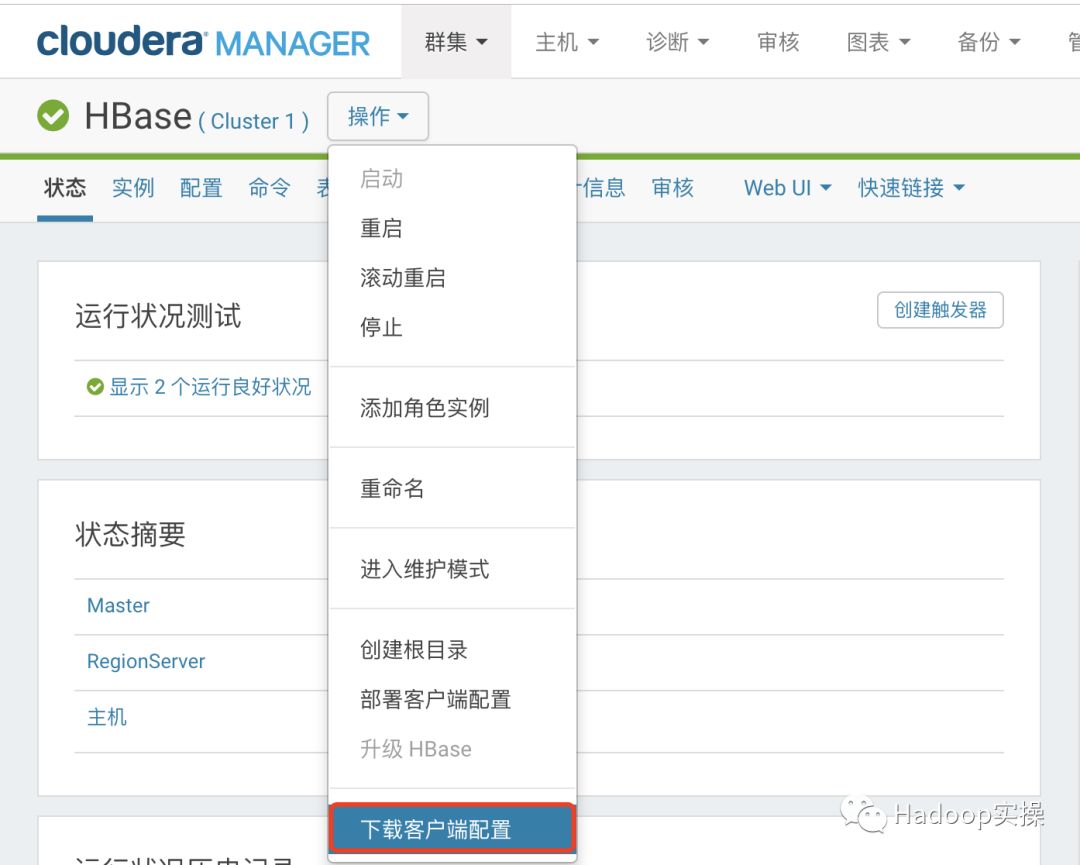
2.在开发环境下为本机配置集群hosts信息,因为下载的HBase客户端配置使用的为hostname

3.在工程的pom.xml文件中增加如下配置
<dependency>
<groupId>org.apache.hadoop</groupId>
<artifactId>hadoop-client</artifactId>
<version>2.6.5</version>
</dependency>
<dependency>
<groupId>org.apache.hadoop</groupId>
<artifactId>hadoop-common</artifactId>
<version>2.6.5</version>
</dependency>
<dependency>
<groupId>org.apache.hbase</groupId>
<artifactId>hbase-client</artifactId>
<version>1.2.0</version>
</dependency>
(可左右滑动)
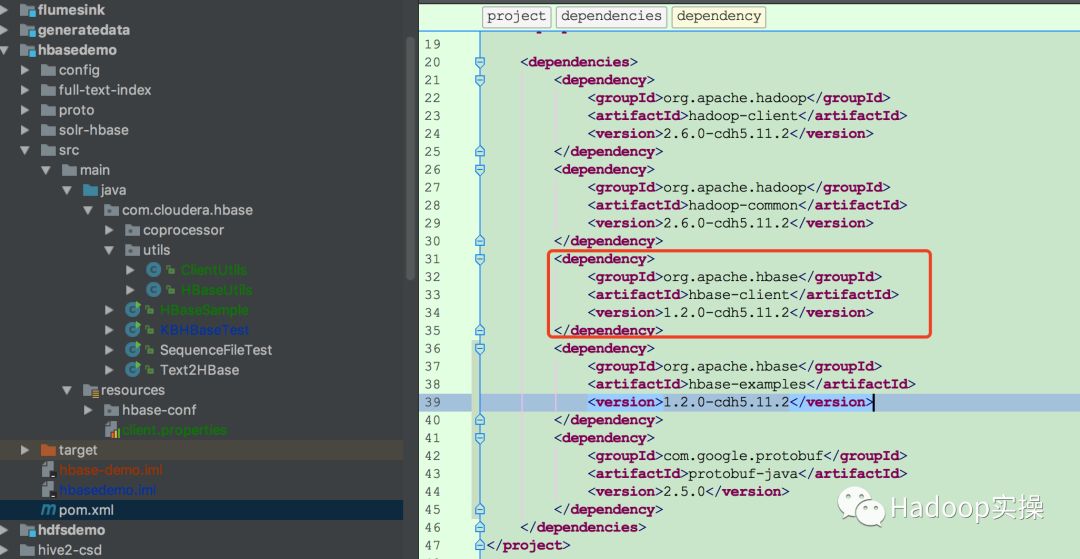
4.在创建的java工程中,将hbase-conf目录及配置文件拷贝至工程resources目录下
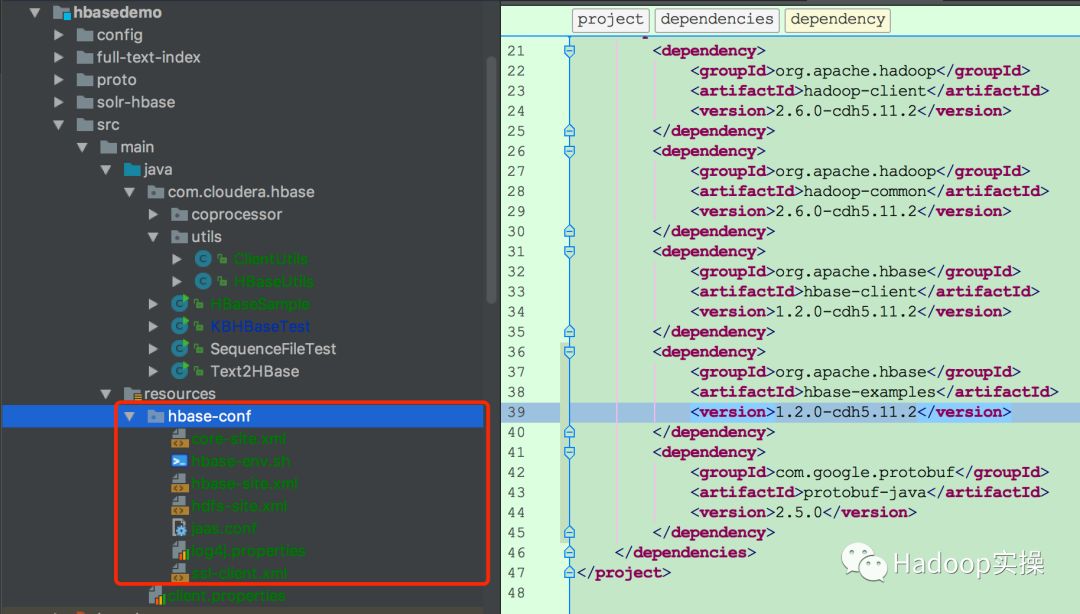
3
客户端访问HBase工具类
1.ClientUtils类主要提供客户端初始化方法,内容如下:
package com.cloudera.hbase.utils;
import org.apache.hadoop.conf.Configuration;
import org.apache.hadoop.hbase.HBaseConfiguration;
/**
* package: com.cloudera.hbase.utils
* describe: 访问HBase客户端工具类
* creat_user: Fayson
* email: htechinfo@163.com
* creat_date: 2018/11/17
* creat_time: 下午4:55
* 公众号:Hadoop实操
*/
public class ClientUtils {
/**
* 初始化访问HBase访问
*/
public static Configuration initHBaseENV() {
try {
Configuration configuration = HBaseConfiguration.create();
configuration.addResource(ClientUtils.class.getClass().getResourceAsStream("/hbase-conf/core-site.xml"));
configuration.addResource(ClientUtils.class.getClass().getResourceAsStream("/hbase-conf/hdfs-site.xml"));
configuration.addResource(ClientUtils.class.getClass().getResourceAsStream("/hbase-conf/hbase-site.xml"));
return configuration;
} catch(Exception e) {
e.printStackTrace();
}
return null;
}
}
(可左右滑动)
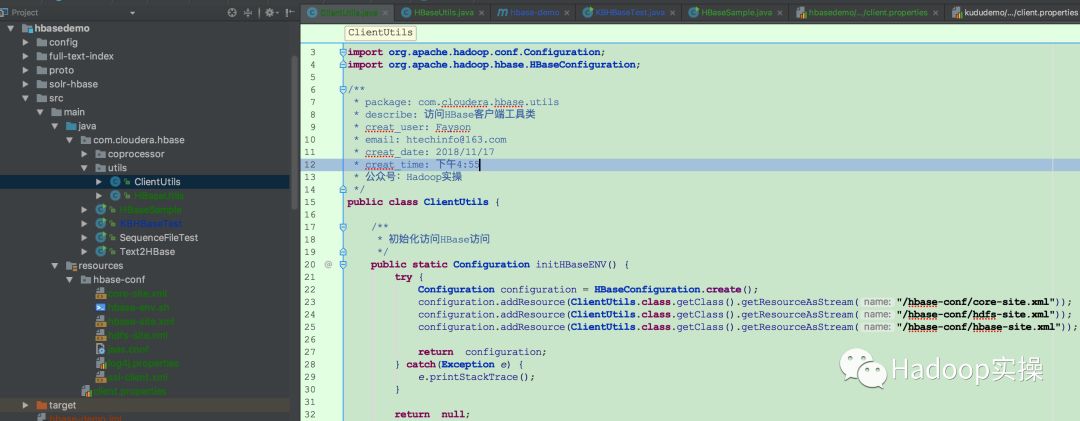
2.HBaseUtils用于操作Kudu的工具类
package com.cloudera.hbase.utils;
import org.apache.hadoop.conf.Configuration;
import org.apache.hadoop.hbase.Cell;
import org.apache.hadoop.hbase.CellUtil;
import org.apache.hadoop.hbase.TableName;
import org.apache.hadoop.hbase.client.*;
import org.apache.hadoop.hbase.util.Bytes;
import java.io.IOException;
/**
* package: com.cloudera.hbase.utils
* describe: 操作HBase工具类
* creat_user: Fayson
* email: htechinfo@163.com
* creat_date: 2018/11/17
* creat_time: 下午5:08
* 公众号:Hadoop实操
*/
public class HBaseUtils {
/**
* 获取HBase Connection
* @param configuration
* @return
*/
public static Connection initConn(Configuration configuration) {
Connection connection = null;
try {
connection = ConnectionFactory.createConnection(configuration);
} catch (Exception e) {
e.printStackTrace();
}
return connection;
}
/**
* 获取库中所有的表
* @param connection
*/
public static void listTables(Connection connection){
try {
//获取所有的表名
TableName[] tbs = connection.getAdmin().listTableNames();
for (TableName tableName : tbs){
System.out.println(tableName.toString());
}
} catch (IOException e) {
e.printStackTrace();
}
}
/**
* 读取HBase表中的数据
* @param tname
* @param connection
*/
public static void readTable(String tname, Connection connection){
try {
TableName tableName = TableName.valueOf(tname);
Admin admin = connection.getAdmin();
//判断tname是否存在,存在就返回true,否则返回false
Boolean flag = admin.tableExists(tableName);
if(!flag) {
System.out.println("表不存在");
return;
}
//判断当前的表是否被禁用了,是就开启
if (admin.isTableDisabled(tableName)){
admin.enableTable(tableName);
}
Table table = connection.getTable(tableName);
ResultScanner resultScanner = table.getScanner(new Scan());
for (Result result:resultScanner){
for (Cell cell:result.listCells()){
//取行健
String rowKey=Bytes.toString(CellUtil.cloneRow(cell));
//取到时间戳
long timestamp = cell.getTimestamp();
//取到族列
String family = Bytes.toString(CellUtil.cloneFamily(cell));
//取到修饰名
String qualifier = Bytes.toString(CellUtil.cloneQualifier(cell));
//取到值
String value = Bytes.toString(CellUtil.cloneValue(cell));
System.out.println("RowKey : " + rowKey + ", Timestamp : " + timestamp + ", ColumnFamily : " + family + ", Key : " + qualifier + ", Value : " + value);
}
}
resultScanner.close();
table.close();
} catch (Exception e) {
e.printStackTrace();
}
}
}
(可左右滑动)
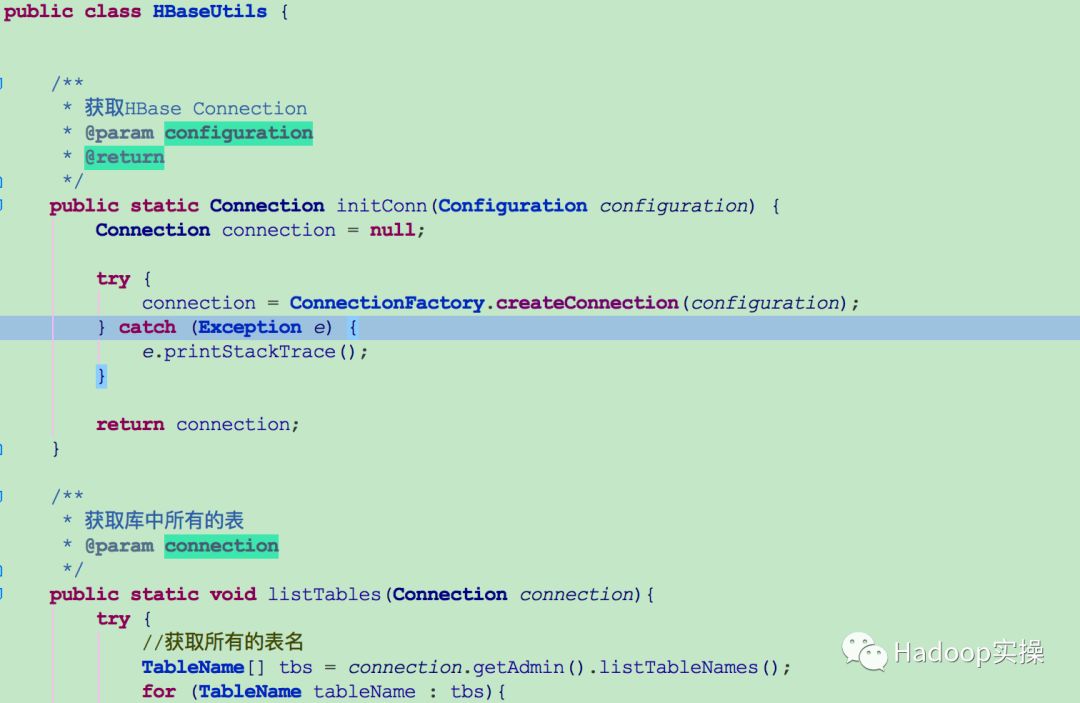
4
HBase访问示例代码及运行
1.HBaseSample.java类调用API接口访问HBase示例代码
package com.cloudera.hbase;
import com.cloudera.hbase.utils.ClientUtils;
import com.cloudera.hbase.utils.HBaseUtils;
import org.apache.hadoop.conf.Configuration;
import org.apache.hadoop.hbase.client.*;
/**
* package: com.cloudera.hbase
* describe: 访问非Kerberos环境下的HBase
* creat_user: Fayson
* email: htechinfo@163.com
* creat_date: 2018/11/17
* creat_time: 下午4:55
* 公众号:Hadoop实操
*/
public class HBaseSample {
public static void main(String[] args) {
try {
Configuration configuration = ClientUtils.initHBaseENV();
Connection connection = HBaseUtils.initConn(configuration);
if(connection == null) {
System.exit(1);
}
//获取HBase库中所有的表
HBaseUtils.listTables(connection);
HBaseUtils.readTable("picHbase", connection);
//释放连接
connection.close();
} catch (Exception e) {
}
}
}
(可左右滑动)
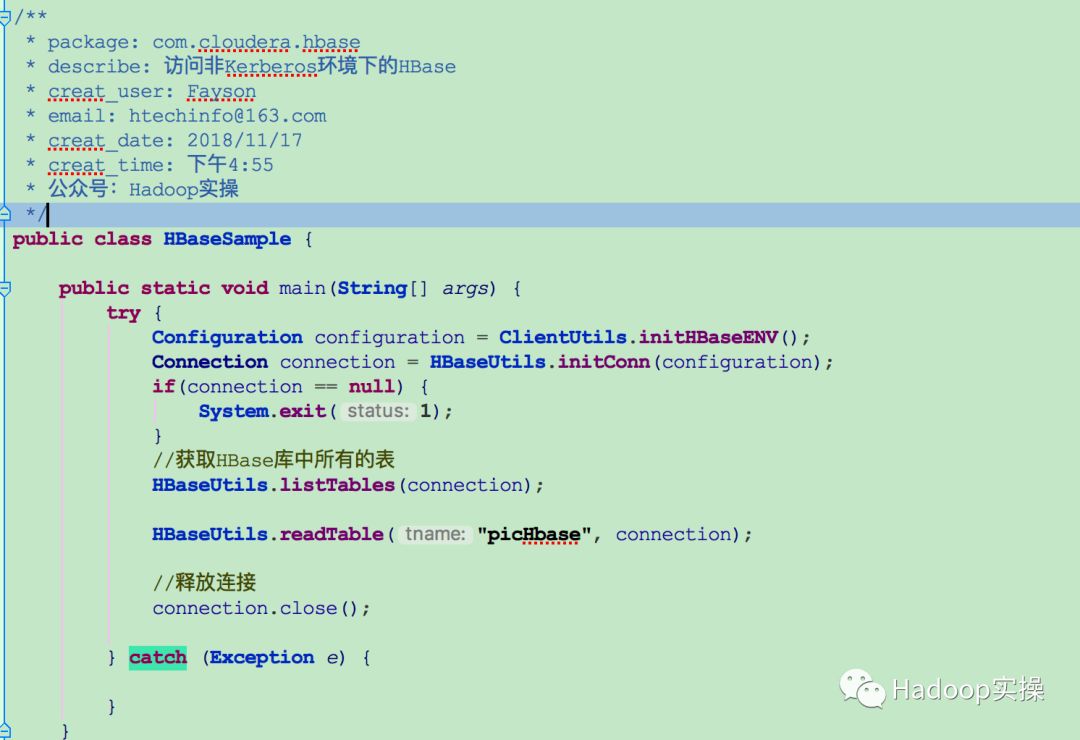
2.示例代码运行
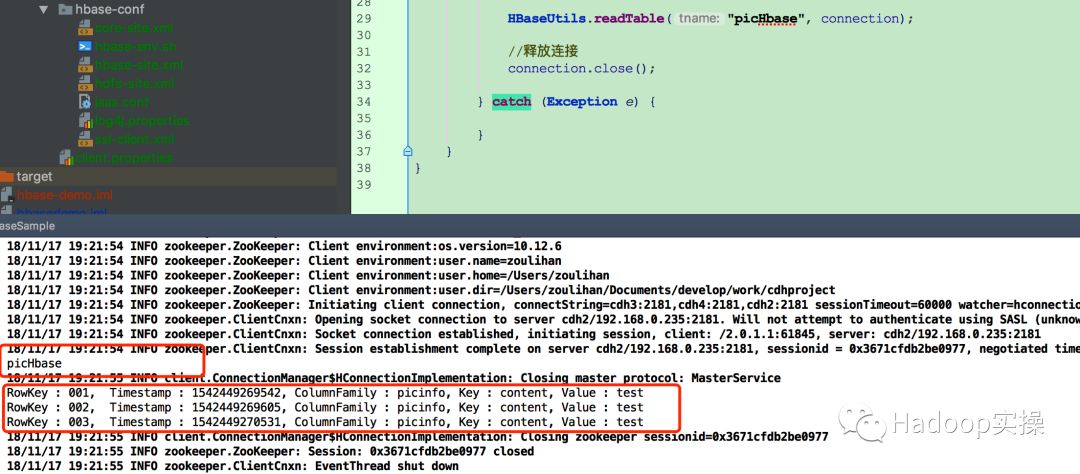
5
总结
1.Java开发访问HBase时,注意Connection对象不要重复创建,在使用完成后记得进行close操作,以避免频繁操作时将Zookeeper的连接数占满。
GitHub源码地址:
https://github.com/fayson/cdhproject/blob/master/hbasedemo/src/main/java/com/cloudera/hbase/HBaseSample.java
https://github.com/fayson/cdhproject/blob/master/hbasedemo/src/main/java/com/cloudera/hbase/utils/ClientUtils.java
https://github.com/fayson/cdhproject/blob/master/hbasedemo/src/main/java/com/cloudera/hbase/utils/HBaseUtils.java
提示:代码块部分可以左右滑动查看噢
为天地立心,为生民立命,为往圣继绝学,为万世开太平。
温馨提示:如果使用电脑查看图片不清晰,可以使用手机打开文章单击文中的图片放大查看高清原图。
推荐关注Hadoop实操,第一时间,分享更多Hadoop干货,欢迎转发和分享。

原创文章,欢迎转载,转载请注明:转载自微信公众号Hadoop实操









